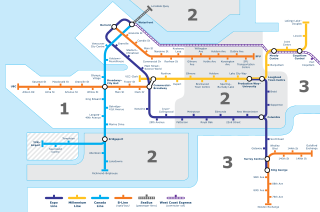
A bicycle-sharing system, bike share program, public bicycle scheme, or public bike share (PBS) scheme, is a shared transport service where bicycles are available for shared use by individuals at low cost.

Transportation in Vancouver, British Columbia, has many of the features of modern cities worldwide. Unlike many large metropolises, Vancouver has no freeways into or through the downtown area. A proposed freeway through the downtown was rejected in the 1960s by a coalition of citizens, community leaders and planners. This event "signalled the emergence of a new concept of the urban landscape" and has been a consistent element of the city's planning ever since.

Vélo'v is a bicycle-sharing system running in the city of Lyon, France, in conjunction with the advertising company JCDecaux. It has been the pioneer of smart bicycle-sharing systems, previous systems being more ad hoc and run similar to a charity. The relationship with JCDecaux allows the city to provide the service on a cost neutral basis for the city, and at a very low cost to users, in return for providing exclusive advertising access on bus shelters and the like. The primary aim is to reduce vehicle traffic within the city. The scheme also aims to reduce pollution, create a convivial atmosphere within the city, and encourage the health benefits of increased activity. Its name is a portmanteau of French vélo (bike) and English love. The first bicycle-sharing system to open in France, after the pioneering 1974 scheme in La Rochelle, its success inspired similar systems in major French and European cities, including Paris' Velib' in 2007. With the success of these two high profile smart bicycle sharing systems a new paradigm of government supporting bike sharing as a part of a public transportation network emerged. It is still the bike-share scheme with the second-highest market penetration in the world, after the Velib'.

Vélib' Métropole is a large-scale public bicycle sharing system in Paris, France. The system encompasses more than 16,000 bikes and 1,400 stations. The name Vélib' is a portmanteau of the French words vélo ("bicycle") and liberté ("freedom").
Montreal has a developed transport infrastructure network, which includes well-developed air, road, rail, and maritime links to the rest of Canada, as well as the United States and the rest of the world. Local public transport includes a metro system, buses, ferry services and cycling infrastructure.

Fifteen is a French company that designs, manufactures and markets products related to bike-sharing. The company produces lightweight bike stands that require virtually no civil engineering and no electricity.
Zagster was a venture-funded startup company based in Boston, Massachusetts that designed, built and operated bike sharing programs for cities, universities, corporate campuses, hotels, and residential communities across the United States. As of July 2019, it operated over 200 bike sharing programs. The bicycle program was suspended in March 2020 due to the COVID-19 pandemic, and then the company terminated all operations in June 2020.
BCycle is a public bicycle sharing company owned by Trek Bicycle and is based in Waterloo, Wisconsin, United States. It has 34 local systems operating in cities across the United States. However, in several cities it operates under a name other than BCycle

Cycling in Canada is experienced in various ways across a geographically huge, economically and socially diverse country. Among the reasons for cycling in Canada are for practical reasons such as commuting to work or school, for sports such as road racing, BMX, mountain bike racing, freestyle BMX, as well as for pure recreation. The amount and quality of bicycle infrastructure varies widely across the country as do the laws pertaining to cyclists such as bicycle helmet laws which can differ by province.
Capital Bixi was a public bicycle sharing system serving Ottawa, Ontario and Gatineau, Quebec, Canada. Launched in June 2009, it was the second BIXI system worldwide after BIXI Montréal. Capital Bixi was run by the National Capital Commission, which sold the bike share program to CycleHop.

PBSC Urban Solutions, formerly the Public Bike System Company, is an international bicycle-sharing system equipment vendor with their headquarters based in Longueuil, Quebec. The company develops bicycle-sharing systems, equipment, parts, and software, and sells its products to cities in Canada, the United States, the United Kingdom, Spain, Brazil and more. The company has sold about 100,000 bikes and 9,000 stations to 45 cities.
Spinlister is a website and mobile app for peer-to-peer sharing of outdoor sporting gear, specifically bikes, surf boards, SUPs, skis and snowboards. Bikes are the company's primary market. It is commonly referred to as the "Airbnb for bikes”. The platform has listings in 63 countries and users from 120 countries. It was founded in 2011 and is headquartered in Santa Monica, California.

Mobi is the trade name of Vancouver Bike Share, Inc. a bicycle-sharing system in Vancouver, British Columbia, Canada. The system is administered by the city and is owned and operated by CycleHop. The system launched on July 20, 2016, with a limited number of stations and bicycles for founding members.
8D Technologies was a Canadian company that developed bicycle-sharing systems and automated parking management systems. It merged with Motivate in 2017.

Baltimore Bike Share was a bicycle sharing system that served the city of Baltimore, Maryland. The system had more than 50 stations, all owned by the Baltimore City government, and operated in a public–private partnership with Bewegen Technologies and Corps Logistics. Launched in 2016, Baltimore Bike Share had the largest electrical-assisted cycling (Pedelec) fleet in North America.

Jump was a dockless scooter and electric bicycle sharing system operating in the United States, New Zealand, Canada, France, Germany, Portugal, the United Kingdom, Mexico and Australia. The bikes were a bright red orange and weighed 70 pounds (32 kg). Riders unlocked bikes using the Uber app and were charged to their Uber account.

A scooter-sharing system or kicksharing system is a shared transport service in which electric motorized scooters are made available to use for short-term rentals. E-scooters are typically "dockless", meaning that they do not have a fixed home location and are dropped off and picked up from certain locations in the service area.

Micromobility refers to a range of small, lightweight vehicles, driven by users personally. Micromobility devices include bicycles, velomobiles, e-bikes, electric scooters, electric skateboards, shared bicycle fleets, and electric pedal assisted (pedelec) bicycles.












